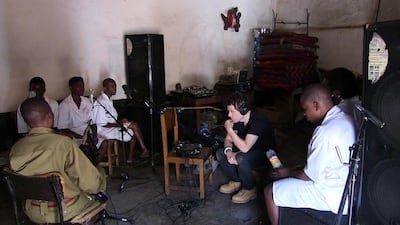For most people, Malawi’s Zomba Central Prison is pretty much the last place in which you would ever wish to find yourself.
Built in 1935 for 340 inmates, it now holds more than 2,000, many of them for life. Untold dark and disturbing stories lurk within these walls – the nightmares really begin when the light fades and those walls close in.
“To be in that environment, in the dark, for even a few minutes would be harrowing,” says Ian Brennan, a regular visitor to the facility. “But for more than 12 hours a day, for years on end – I can’t imagine it.”
Brennan, a well-known crisis-management expert, hosted violence-prevention sessions at Zomba – but the visits were motivated by his other career.
The well-travelled Californian is better known worldwide as a Grammy-winning producer, who works with high-profile acts (Flea, Tinariwen and Lucinda Williams), and discovers unlikely performers (such as Rwandan folk group The Good Ones).
His latest initiative, Zomba Prison Project, very much belongs to the latter camp. The stars this time are the inmates themselves, who are given a rare chance to showcase their talent.
They are encouraged to write and compose their own tracks, and two albums have been released – last year's Grammy-nominated I Have No Everything Here and in September, I Will Not Stop Singing.
The results are strikingly soulful works, with lyrics both piercing and contemplative. I Will Not Stop Singing begins with a track by inmate Vincent Saulos, entitled I Am Done With Evil.
“That’s somebody who’s there for life for murder,” Brennan says.
One of this year’s most remarkable albums: the 14 songs in the new collection are by Zomba inmates, the majority of whom had never written or performed before meeting Brennan.
Most are sung in Malawi’s Chichewa language, but the titles reveal much.
The stunning I Will Never Stop Grieving For You, My Wife was the starting point for the whole album, in fact.
The producer had “begged and urged” the singer, Thomas Binamo, to write about his personal life, “and for weeks he absolutely refused”, says Brennan. “Then he pulls this song out of his hat. At that moment the whole thing flipped – it became: ‘We have to put this out.’”
The second album comes hot on the heels of I Have No Everything Here which, as Brennan tells it, largely went unnoticed when released in January last year, and so the producer moved on.
Then “shockingly, almost a year later”, it received a coveted Grammy Award nomination, in the World Music section, alongside names such as Angélique Kidjo, Anoushka Shankar and Gilberto Gil. Suddenly, people wanted to know about this prison and its personnel.
It was pure artistic impulse that drove Brennan and his wife – photographer and filmmaker Marilena Delli – to make their first visit to the prison in 2013, despite Zomba having no previous creative reputation.
“In general, I’m not interested in proper musicians,” he says. “It’s more interesting, but more dangerous, to have people that don’t play, or don’t normally write. The first album, more than half of it was women who don’t play instruments, and none of them wrote songs.”
Zomba is a mixed prison, but the genders have different musical histories. The male prisoners already had a band and were relatively keen, but while female inmates often sang together (their Yao Muslim Sisters Choir appear on the new album), individually, they refused.
By the final day of that first trip, Brennan was resigned to this being an all-male project. Then, at the 11th hour, the women finally relented.
“When the first woman finally stood up and offered a song, that was amazing,” he says. “And that opened up the floodgates.”
Even a prison officer, Ines Kaunde, contributed, with songs on both albums, including the stark I See the Whole World Dying of Aids.
Binamo also wrote one of the more painfully heartfelt tracks on that first record, Please, Don't Kill My Child, about a horrifying local custom "where people will actually kill another person's child as an act of revenge", Brennan explains.
He never intended to release a second album, but having returned to Zomba in the aftermath of that Grammy nomination, he felt compelled to compile further musical tales.
Interestingly, despite the subject matter, the tone of both albums is largely upbeat and catchy. One entirely uplifting piece on the new record is I Will Not Return to Prison, by the now- released Chikondi Salanje – a "great singer, great guitar player", says Brennan.
While conceding that his time at Zomba is probably over, too, Brennan hopes to “keep the work going, giving people opportunities to express themselves”. Profits from albums go to humanitarian projects that assist Zomba prison.
As for the Grammy, it went to Benin-born singer Kidjo, but the nomination – Malawi’s first, ever – was reward enough.
Zomba’s resident drummer Ernest Kufandikor summed up the mood: “The Grammy nomination confirmed that a prison is a reformatory centre [and] not a dumping ground.”
These prisoners are paying their debts to society, one song at a time.
artslife@thenational.ae

